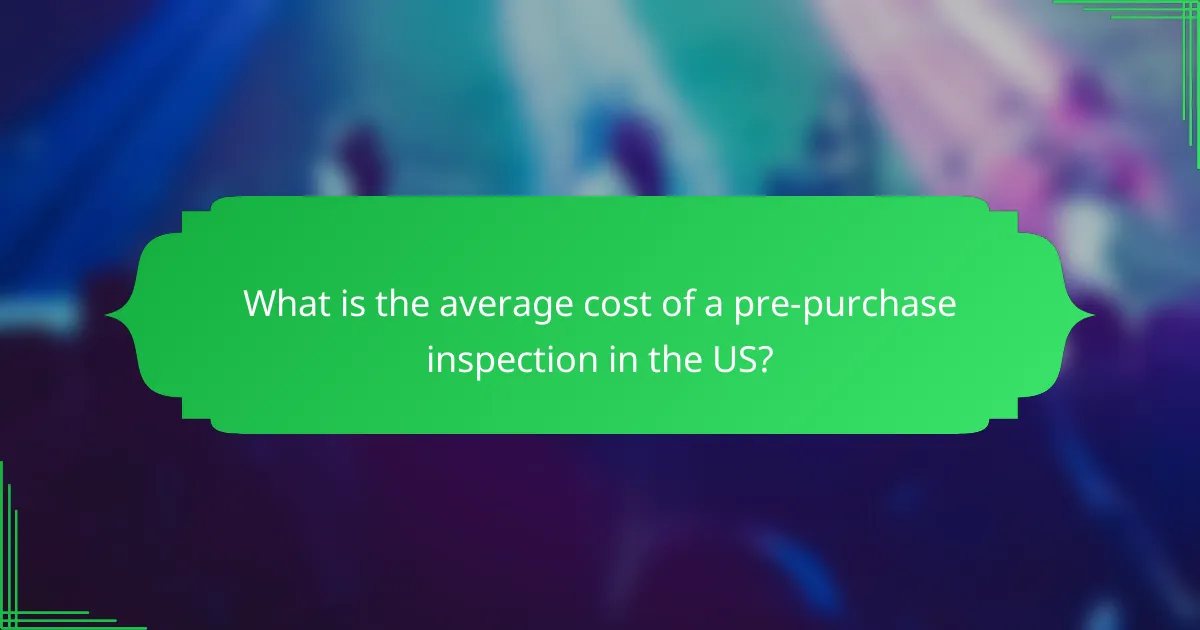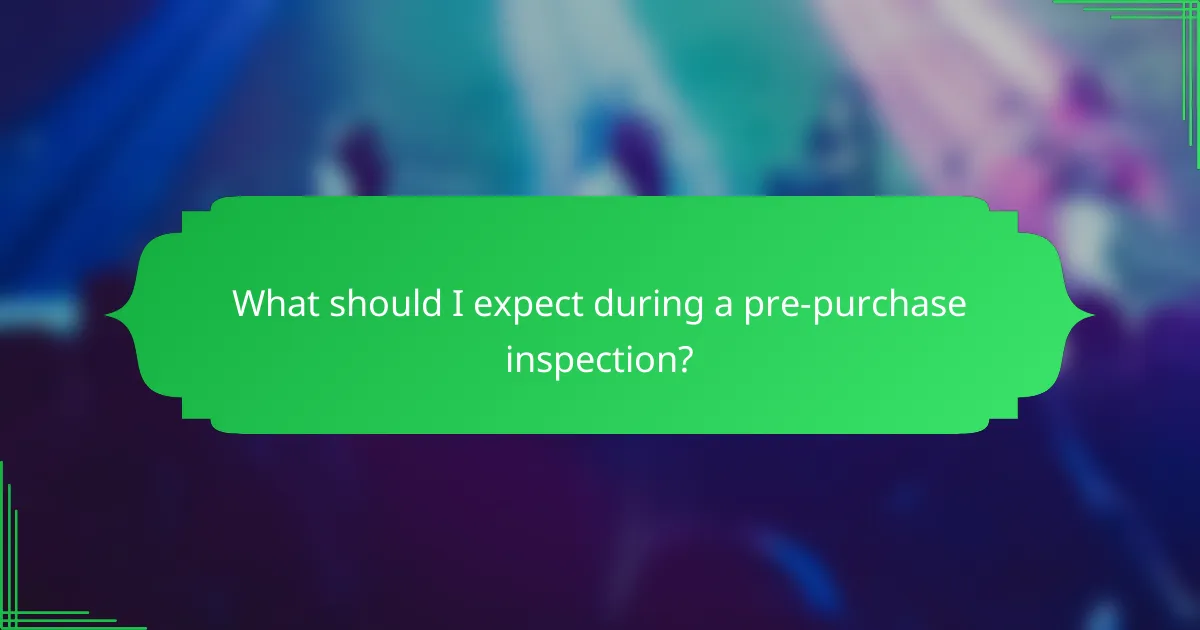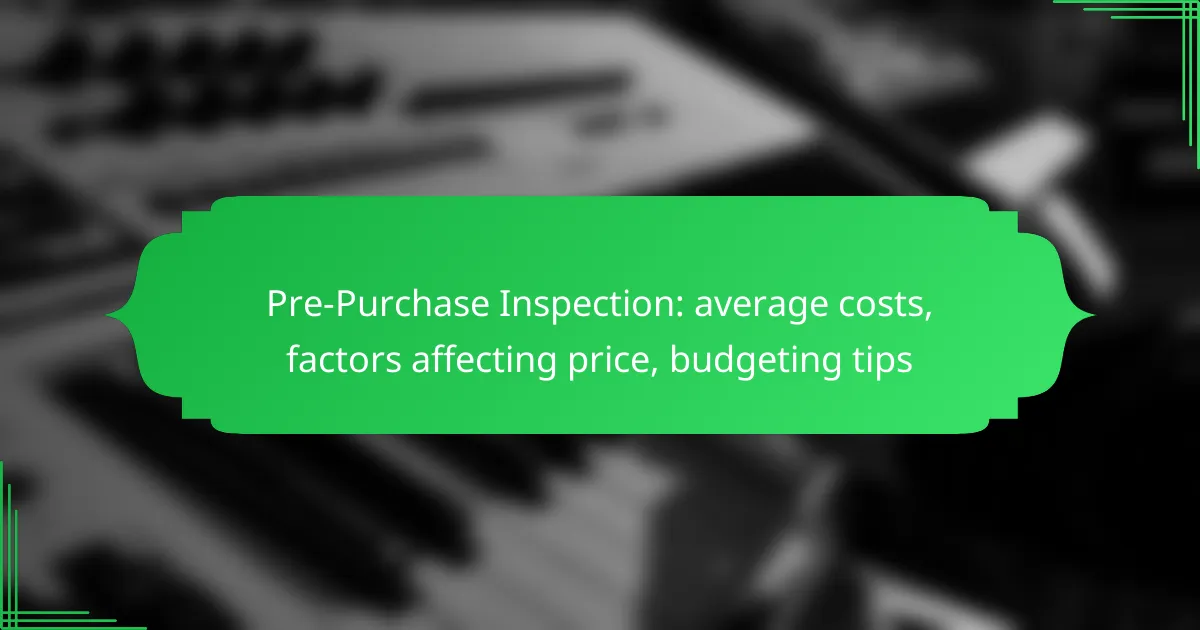A pre-purchase inspection is a crucial step in the buying process, typically costing between $100 and $300 in the US. The final price can fluctuate based on factors such as the vehicle type, location, and the complexity of the inspection. To budget effectively, it’s important to estimate these costs and set aside the necessary funds for a thorough evaluation.

What is the average cost of a pre-purchase inspection in the US?
The average cost of a pre-purchase inspection in the US typically ranges from $100 to $300. This price can vary based on factors such as the type of vehicle, its location, and the complexity of the inspection required.
Typical price range for inspections
Pre-purchase inspections generally fall within a price range of $100 to $300, with most inspections costing around $150 to $200. Luxury or specialty vehicles may incur higher fees, sometimes exceeding $400, due to the need for more detailed assessments and experienced inspectors.
Additionally, geographic location plays a significant role in determining inspection costs. Urban areas may have higher prices compared to rural regions, reflecting local market conditions and demand for inspection services.
Factors influencing inspection costs
Several factors can influence the cost of a pre-purchase inspection. The type of vehicle being inspected is a primary consideration; for example, older cars or those with complex systems may require more extensive checks, leading to higher fees.
Other influencing elements include the inspector’s experience, the inspection’s depth, and any additional services requested, such as a detailed report or follow-up inspections. It’s advisable to inquire about what is included in the inspection to avoid unexpected costs.

What factors affect the price of pre-purchase inspections?
The price of pre-purchase inspections can vary significantly based on several key factors. Understanding these factors helps buyers budget effectively and choose the right service for their needs.
Type of vehicle
The type of vehicle being inspected plays a crucial role in determining the inspection cost. Luxury cars, sports vehicles, and larger SUVs typically incur higher fees due to the complexity and specialized knowledge required. In contrast, standard sedans or compact cars usually have lower inspection costs.
For example, an inspection for a luxury vehicle might range from $200 to $500, while a standard car inspection could be between $100 and $200. It’s essential to consider the vehicle’s make and model when budgeting for an inspection.
Location of inspection
The location where the inspection takes place can significantly influence the price. Urban areas often have higher costs due to increased demand and overhead expenses for service providers. Conversely, inspections in rural areas may be more affordable but could come with limited service options.
For instance, a pre-purchase inspection in a major city like New York might cost more than one in a smaller town. Always compare local rates and consider traveling to a nearby area if it offers better pricing.
Inspection complexity
The complexity of the inspection itself can affect the overall cost. A basic inspection may cover essential checks like engine performance and exterior condition, while a comprehensive inspection could include detailed diagnostics, fluid analysis, and even a road test.
Typically, a basic inspection might cost around $100 to $150, while a more thorough inspection could range from $300 to $600. Buyers should assess their needs and choose the level of inspection that aligns with their budget and the vehicle’s condition.

How can I budget for a pre-purchase inspection?
Budgeting for a pre-purchase inspection involves estimating the costs and setting aside funds to cover them. Typically, you should allocate a few hundred dollars, depending on the type of inspection and the property’s location.
Setting aside funds
To effectively budget for a pre-purchase inspection, start by determining a reasonable amount to set aside. Generally, inspections can range from $300 to $600, but for larger properties or specialized inspections, costs can go higher. Aim to save slightly above the estimated cost to accommodate any unforeseen expenses.
Consider creating a dedicated savings account for this purpose. This way, you can easily track your progress and ensure you have the necessary funds when the time comes for the inspection.
Comparing inspection services
When budgeting, it’s crucial to compare different inspection services to find the best value. Research local inspectors and request quotes, ensuring you understand what each service includes. Some inspectors may charge less but offer fewer services, while others may provide comprehensive reports and follow-up consultations.
Look for reviews and ask for recommendations to gauge the quality of service. It’s often worth spending a bit more on a reputable inspector who can provide a thorough assessment, potentially saving you money in the long run by identifying issues before purchase.

What are the benefits of a pre-purchase inspection?
A pre-purchase inspection provides crucial insights into a vehicle’s condition, potentially saving buyers from costly repairs. It helps identify existing issues and offers leverage in negotiations, ensuring a more informed purchasing decision.
Identifying hidden issues
A pre-purchase inspection can uncover hidden problems that may not be visible during a casual walk-around or test drive. Mechanics often check for issues such as frame damage, engine wear, and signs of previous accidents. This thorough examination can reveal concerns that could lead to significant expenses down the line.
Common hidden issues include leaks, rust, and worn-out components. For instance, a small oil leak might seem minor but could indicate a larger engine problem. Investing in an inspection typically costs a few hundred dollars, but it can prevent thousands in repairs later.
Negotiating power
Having a pre-purchase inspection report gives buyers a stronger position in negotiations. If the inspection reveals issues, buyers can request repairs or a price reduction based on the findings. This information can be a powerful tool to justify a lower offer.
For example, if the inspection shows that the tires need replacement, buyers can negotiate a discount equivalent to the cost of new tires. This approach not only saves money but also ensures that the buyer is making a fair investment in the vehicle.

How do I choose a reliable inspection service?
To choose a reliable inspection service, prioritize certified inspectors with good reputations and experience. Look for services that provide detailed reports and have positive customer feedback.
Researching certified inspectors
Start by looking for inspectors who are certified by recognized organizations, such as the International Association of Certified Home Inspectors (InterNACHI) or the American Society of Home Inspectors (ASHI). These certifications indicate that the inspector has met specific training and education standards.
Check local regulations, as some areas may require specific licenses or certifications for home inspectors. Ensure that the inspector you choose complies with these legal requirements to avoid potential issues.
Reading customer reviews
Customer reviews can provide valuable insights into the reliability and thoroughness of an inspection service. Look for reviews on independent platforms, such as Google or Yelp, to get an unbiased perspective on the inspector’s performance.
Pay attention to recurring themes in reviews, such as punctuality, thoroughness, and the clarity of the inspection report. A pattern of positive feedback in these areas can indicate a trustworthy service.

What should I expect during a pre-purchase inspection?
A pre-purchase inspection evaluates a vehicle’s condition before buying, identifying potential issues that could affect its performance and safety. Expect a thorough examination covering mechanical, electrical, and structural components to ensure the vehicle meets your standards.
Common inspection steps
During a pre-purchase inspection, several key steps are typically followed. The inspector will assess the vehicle’s exterior for signs of damage, check the interior for wear and tear, and evaluate the engine and transmission for functionality. Additionally, they will inspect the brakes, suspension, and tires to ensure they are in good condition.
It’s also common to run diagnostic tests to uncover any hidden electronic issues. A comprehensive report will be provided, detailing the findings, which can help you make an informed decision about the purchase.
Typical duration of inspections
The duration of a pre-purchase inspection usually ranges from one to two hours, depending on the vehicle’s complexity and the thoroughness of the inspection. For larger vehicles or those with more intricate systems, the inspection may take longer.
Scheduling the inspection during business hours can help ensure that the inspector has adequate time to perform a detailed evaluation without interruptions. Always confirm the expected duration with the inspection service beforehand to plan accordingly.

What are some common misconceptions about pre-purchase inspections?
Many people believe that pre-purchase inspections are unnecessary or that they only serve to delay a purchase. In reality, these inspections provide critical insights into a vehicle’s condition, helping buyers make informed decisions and potentially saving them from costly repairs down the line.
Cost vs. value
The cost of a pre-purchase inspection typically ranges from $100 to $200, depending on the vehicle’s make, model, and location. While this may seem like an added expense, the value gained from identifying potential issues can far outweigh the initial investment.
For example, discovering a hidden engine problem during an inspection can save thousands in repair costs later. Buyers should view the inspection fee as a small price to pay for peace of mind and financial protection.
Inspection thoroughness
The thoroughness of a pre-purchase inspection can vary significantly based on the service provider. A comprehensive inspection should cover key areas such as the engine, transmission, brakes, and suspension, as well as a test drive to evaluate performance.
To ensure a detailed assessment, buyers should ask potential inspectors about their checklist and experience. Opting for a certified mechanic or a reputable inspection service can enhance the quality of the evaluation, leading to a more informed purchase decision.
